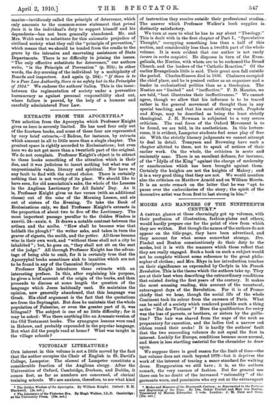VICTORIAN LITERATURE.t
°us, interest in this -volume is not a little moved by the fact that the author occupies the Chair of English in St. David's College, Lampeter. The alumni of Lampeter constitute a considerable fraction of the Anglican clergy. After the Universities of Oxford, Cambridge, Durham, and Dublin, it comes first, as far as numbers are concerned, of clerical training schools. We are anxious, therefore, to see what kind
• The Golden Wisdont of the Apocrypha. By William Knight. Oxford : B. H. Blackwell. [22. net. J
t The Literature of the Victorian Era. By Hugh Walker, LL.D. Cambridge : at the University Prem. (10s. net.)
of instruction they receive outside their professional studies., The answer which Professor Walker's book supplies is distinctly satisfactory.
We turn at once to what he has to say about "Theology." This is dealt with in the first chapter of Part L, "Speculative Thought," occupying something less than a half of this section, and considerably less than a twelfth part of the whole volume. It is soon evident that our author is not ready iurare in verba mogistri. He disposes in turn of the Evan- gelicals, the Noetics, with whom are to be reckoned the Broad Church, and the leaders of the 'Catholic Reaction." Of the earlier Evangelicals little is said. Their great men fall outside the period. Charles Simeon died in 1836. Chalmers occupied the chief place, and he is praised rather as an organiser and a leader in ecclesiastical politics than as a theologian. The Noetice are " limited " and "ineffective." F. D. Maurice, we are told, "best illustrates their ineffectiveness." We cannot agree, though we allow that his influence is to be traced rather in the general movement of thought than in any special teaching, and that his most striking work, Prophets and Sings, may be described as being the least, strictly theological. J. H. Newman is subjected to a very severe criticism. The real force of the Oxford Movement is to. be found, we are told, in its aestheticism. In this lecture. room, it is evident, Lampeter students feel some play of free air. With the strictly literary judgments we cannot attempt to deal in detail. Tennyson and Browning have each a chapter allotted to them, not to speak of notices of their earlier work. On the whole, the criticism is acute and eminently sane. There is an excellent defence, for instance, of the "Idylls of the King" against the charge of modernity or anachronism which has been brought against them. Certainly the knights are not the knights of Malory ; and it is a very good thing that they are not. We would mention also the criticism on Matthew Arnold and on William Morris. It is an acute remark on the latter that he was "apt to pause over the embroideries of the story ; the spirit of the decorative artist was from first to last strong in him."










































 Previous page
Previous page